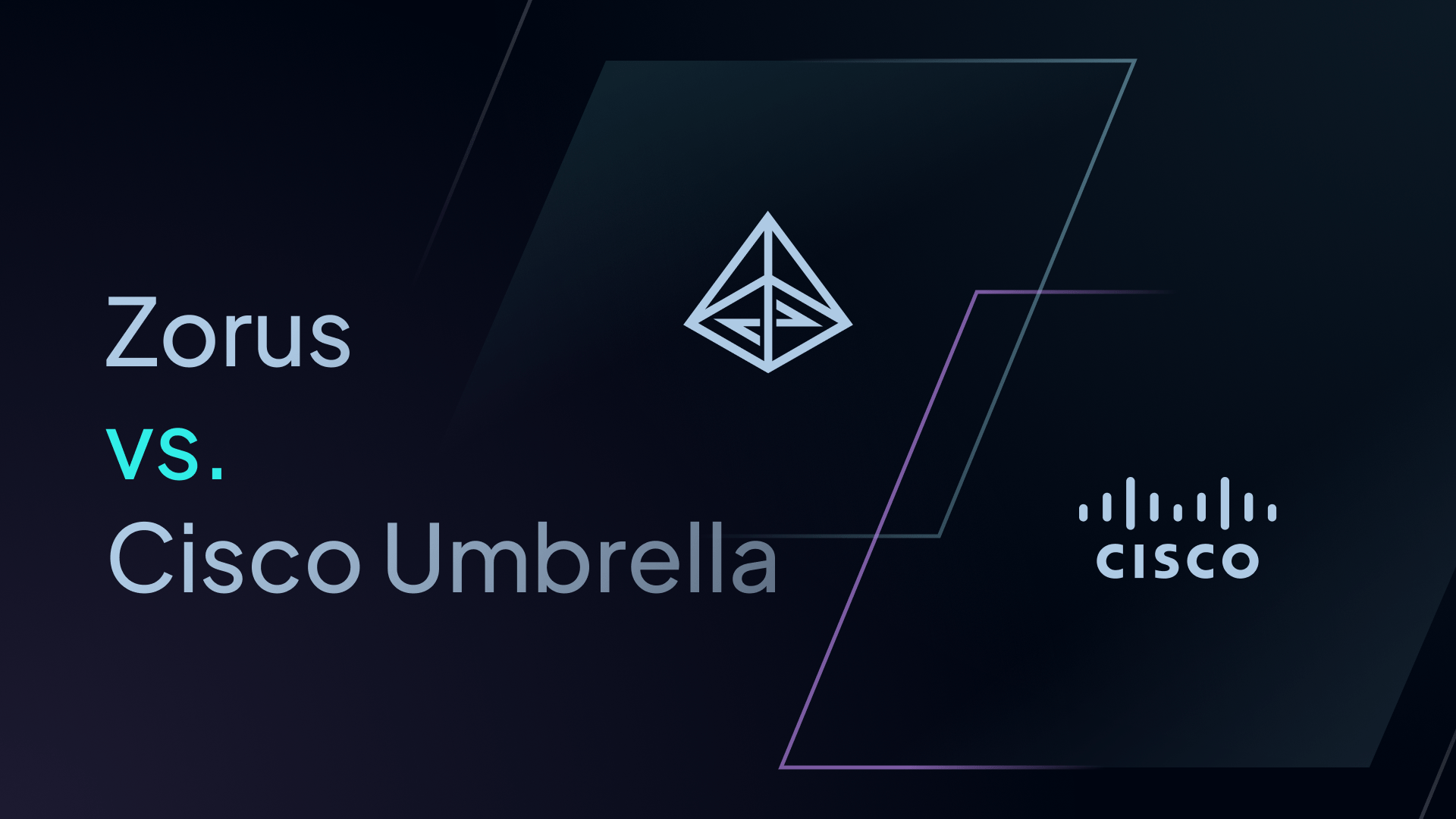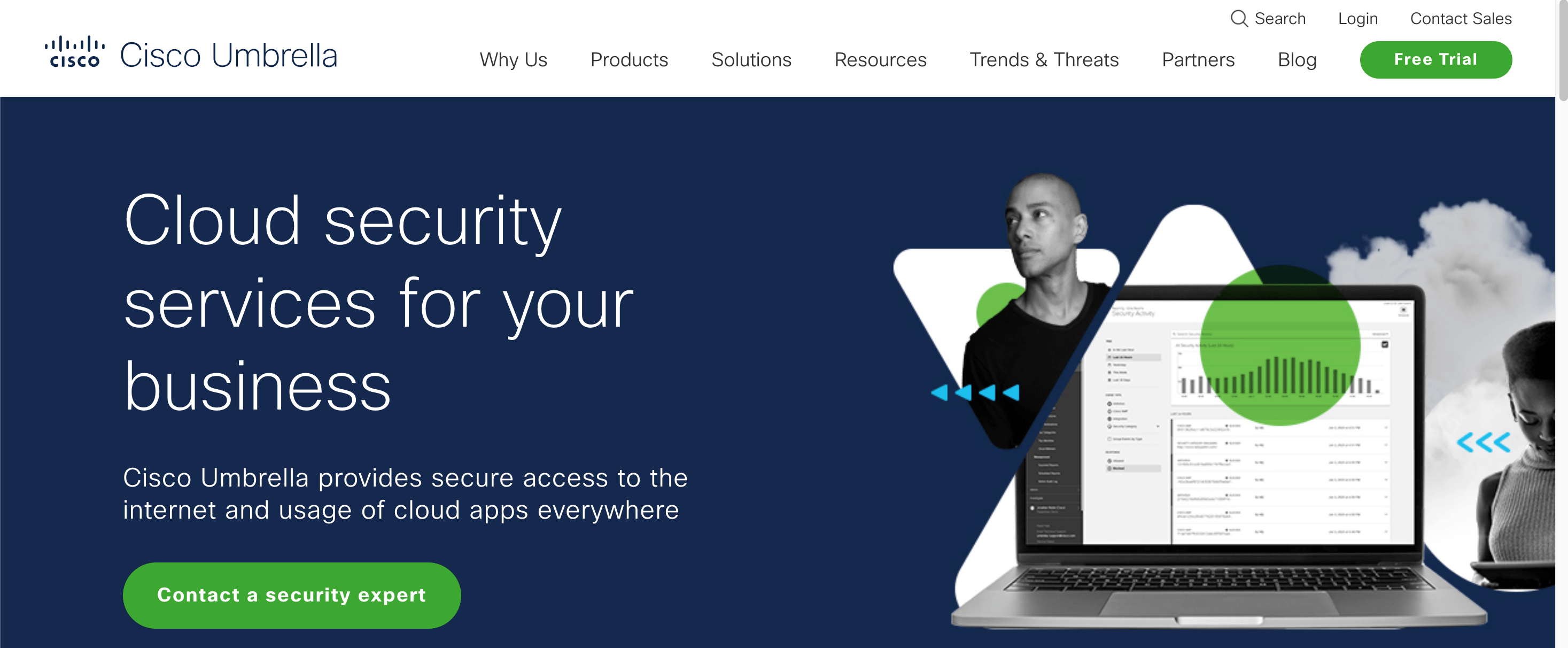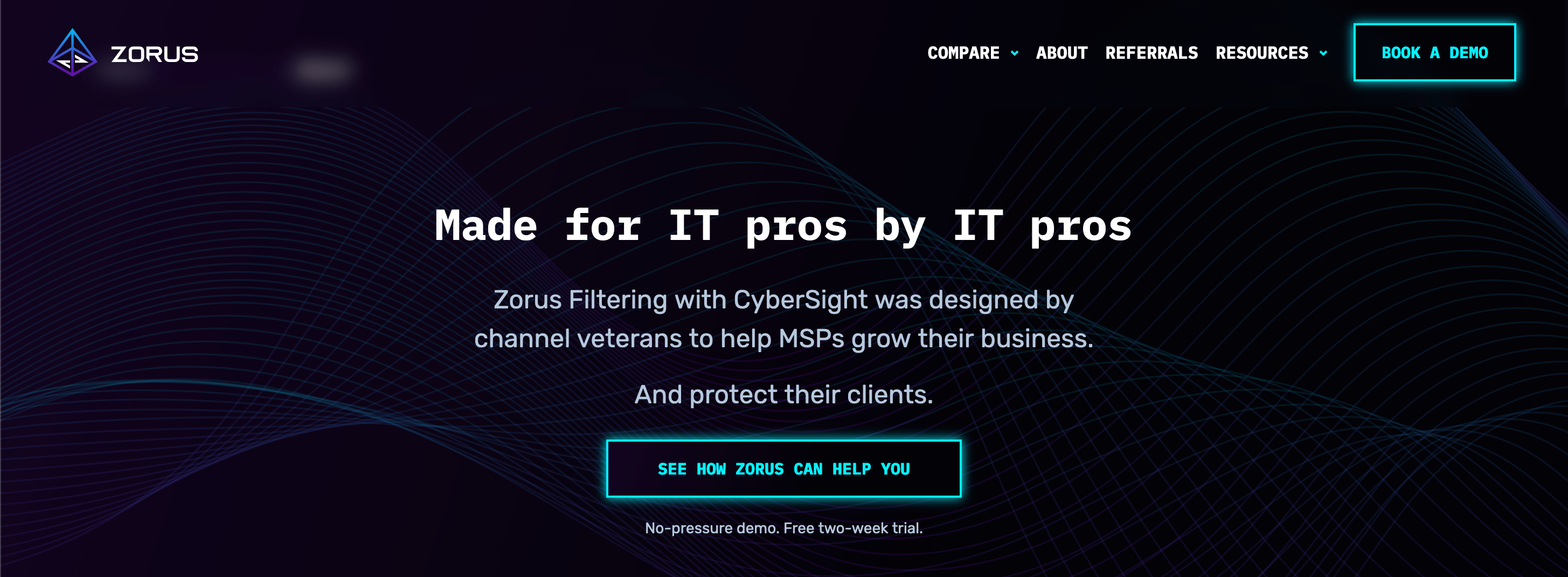Zorus vs. Cisco Umbrella
Compare Zorus vs. Cisco Umbrella on features, pricing, analytics & support – plus discover a third option that outperforms them both.

Businesses require strong web security to protect against malware, phishing, and data breaches. Cisco Umbrella and Zorus are two leading DNS-layer security platforms offering automated threat blocking.
But which one should you choose?
In this comparison, we’ll explore each platform's strengths and drawbacks to help you decide which is the right fit for your enterprise.
We also propose an alternative, just in case neither of these two platforms appeals to you.
What are Cisco Umbrella and Zorus?
Cisco Umbrella and Zorus are two DNS-layer security tools designed to block malicious domains, unwanted content, and threats before they reach the network.
Cisco Umbrella is designed for large enterprises. It provides advanced threat intelligence, secure web gateway (SWG) capabilities, and easy integration with other Cisco security products.
Zorus is focused on simplicity and effectiveness, particularly for MSPs. It uses AI to block malware, phishing, and unwanted content. It is worth noting that in April 2025, Zorus was acquired by DNSFilter.
Cisco Umbrella: Pros and Cons

Best for: Enterprises and large organizations, especially those that already use Cisco products.
Key Features:
- Blocks malicious domains and threats
- Filters web traffic, enforces policies, and prevents data exfiltration
- Uses Cisco Talos for real-time global threat detection
✅ Pros:
- Strong enterprise integration
- Granular policy controls
- Detailed reporting and analytics
❌ Cons:
- Too complex for SMBs
- More expensive than competitors
- Steep learning curve
Overall Thoughts on Cisco Umbrella
Cisco Umbrella primarily targets large enterprises and organizations, which is also its major drawback. Its complexity and cost make it less practical for SMBs without dedicated IT resources. If you need scalable, high-performance security with deep threat visibility, Umbrella is a strong choice, especially if you have the budget to match. However, simpler and more affordable alternatives may be better suited for smaller businesses.
Zorus: Pros and Cons

Best for: MSPs looking for an easy-to-use, AI-powered DNS filtering solution.
Key Features:
- Detects and blocks malware, phishing, and malicious domains
- Quick setup with no hardware or complex configurations required
- Centralized management for MSPs handling multiple client networks
✅ Pros:
- Easy to Use
- Competitive pricing
- Strong web filtering
❌ Cons:
- Lacks some advanced features
- Basic analytics compared to rivals
- Smaller threat intelligence network
Overall Thoughts on Zorus
Zorus is a streamlined, cost-effective DNS security solution perfect for MSPs that prioritize ease of use and strong web filtering. While it lacks the depth of enterprise-grade tools like Umbrella, it’s still an appealing solution for smaller businesses.
Zorus vs. Cisco Umbrella
Plans & Pricing
Cisco Umbrella offers four distinct plans to fit different security needs:
- DNS Essentials
- DNS Advantage
- SIG Essentials
- SIG Advantage
However, Cisco doesn’t list prices directly on its website. To get an accurate quote, you’ll need to contact their sales team and share details like your organization's size, your desired contract length, and the features required.
While official pricing isn't published, feedback from users and forums suggests the estimated cost is between $2.50 to $28/user/month, depending on your specific needs.
Similarly, Zorus does not publish its pricing online either, so you'll need to reach out to their sales team for a quote tailored to your organization. But, based on feedback from users on platforms like Reddit, it’s reported to cost just under $3/user/month with a minimum of 100 users.
Since neither platform is open about its pricing, we’ve ranked this as a tie.
Features, Clients, and Integrations
Although both platforms target different audiences, there’s still an overlap in their feature set.
| General Features | Cisco Umbrella | Zorus |
|---|---|---|
| Basic Malware & Phishing Protection | ✅ | ✅ |
| Advanced ML-Based Malware Protection | ✅ | ✅ |
| Flexible Content Blocking | ✅ | ✅ |
| Blockable Services | Limited | Limited |
| Geo-Custom Rules | Geo-IP blocking only | Geo-IP blocking only |
| Modern DNS Protocols | ✅ | ✅ |
| Windows | ✅ | ✅ |
| MacOS | ✅ | Beta |
| Router/Network | ✅ | ✅ |
| RMM Integration | ✅ | ✅ |
| Full API Access | ✅ | ✅ |
| Active Directory Support | ✅ | ✅ |
Having said that, there are also some notable differences.
| General Features | Cisco Umbrella | Zorus |
|---|---|---|
| Traffic Redirection | ❌ | ❌ |
| Ad & Tracker Blocking | ❌ | ❌ |
| Remote Browser Isolation | ✅ | ❌ |
| Zero Trust Network Access | ✅ | ❌ |
| Secure Web Gateway (SWG) | ✅ | ❌ |
| Cloud Access Security Broker | ✅ | ❌ |
| Linux | ❌ | ❌ |
| Mobile Device Support | ✅ | ❌ |
| Single Sign-on (SSO) | ✅ | ❌ |
As you can see, while Zorus may suffice for basic DNS protection, Cisco Umbrella offers a far greater breadth of features (albeit at a significantly higher reported cost). Even so, Umbrella wins this category.
Analytics & Reporting
| Analytics & Reporting | Cisco Umbrella | Zorus |
|---|---|---|
| Admin Action Logs | ✅ | - |
| Full Query Logging | ✅ | ✅ |
| Query Log Retention | 30 days | 90 days |
| Query Log Export | ✅ | ✅ |
| Report Retention | Depends on report (30 days to 1 year) | - |
| Analytics Retention | Up to 1 year | - |
| Data Export | ✅ | ✅ |
| SIEM Log Streaming | ✅ | Roadmap |
| Per-user Reporting | ✅ | ✅ |
| Scheduled Reporting | ✅ | ✅ |
| Data Storage Regions | NA/EU | ❌ |
It’s unclear whether Zorus offers key features like admin action logs, and how long they store reports and analytics data. This lack of transparency makes a direct, one-to-one comparison difficult.
On the other hand, Cisco Umbrella provides more clarity and offers features like SIEM log streaming, which Zorus currently lacks.
Because of Cisco’s more open approach to its reporting and analytics capabilities, we give the edge to Umbrella in this category.
Support
| Support | Cisco Umbrella | Zorus |
|---|---|---|
| Community Support | ✅ | ❌ |
| Docs/Knowledge Base | ✅ | ✅ |
| Email Support | ✅ | ✅ |
| Chat Support | ❌ | ✅ |
| Enhanced SLA | Add-on | ❌ |
Support for users is an important element of any service. On paper, Cisco Umbrella appears to be the winner due to its community support and enhanced SLA, both of which Zorus doesn’t offer.
However, a recurring complaint about Cisco Umbrella is its inadequate post-sales customer support, which is evident on review sites and online forums.
Zorus vs. Cisco Umbrella vs. Control D
There are clear gaps when examining Cisco Umbrella and Zorus. While Zorus looks great for MSPs, it lacks the capabilities of Umbrella. Cisco is well-suited for large enterprises, but it may be too complex and costly for small and mid-sized companies.
The alternative? Control D.
Easy Onboarding & Transparent Pricing
Control D offers straightforward pricing, with no plans, no upsells, and no gated features for core functionality, so you don’t get any nasty surprises:
- School/Non-Profit: $0.50/endpoint/month
- MSP: $1/endpoint/month
- SMB: $2/endpoint/month
- Enterprise: Contact
There’s also a 30-day free trial (no credit card required), so you can test Control D before making a purchase.
Best-in-Class Malware Protection
Control D offers AI-based threat detection and protection, allowing you to block both known and unknown threats in real time. In fact, an independent test conducted in June 2025 showed that Control D blocks 99.98% of malware, ranking first among all competitors.
This protection extends to phishing, ransomware, and all other cyber threats, ensuring your business remains safe at all times.
Ad & Tracker Blocking
Control D removes ads and trackers from your internet traffic before they even reach your devices. Because it operates at the DNS level, it blocks unwanted content across your entire network, not just in a single browser.
The result is faster page loads and fewer privacy-invading scripts, without needing to install ad blockers on every device. It’s seamless, efficient, and delivers a cleaner, more private browsing experience.
You also get full control over how aggressively you want to block them. Choose from Relaxed, Balanced, or Strict modes to match your needs. Neither Cisco Umbrella nor Zorus blocks ads or trackers.
Blockable Services
Control D provides precise control over what runs on your network by allowing you to manage Services, not just broad content categories.
With a library of over 1,000 Services, you can easily allow, block, or redirect specific apps, platforms, and websites with a single toggle. Just search for the Service you want to manage and apply your rule. No need to dig through domains or maintain long blocklists.
For context, both Cisco Umbrella and Zorus offer fewer than 100, making Control D one of the most granular and flexible solutions available.
Traffic Redirection
Control D’s Traffic Redirection feature provides the option to route different traffic through different locations. With over 100 exit locations in more than 60 countries, you can ensure your traffic is directed exactly where you want it to go, all without a VPN.
You can set a default location for all traffic or redirect specific Services for a tailored approach. Cisco Umbrella and Zorus do not offer this capability.
Geo-Custom Rules
Control D’s Geo-Custom Rules allow precise control over internet traffic based on geographic location. Users can block, allow, or redirect traffic to/from specific countries.
For instance, you can create rules such as:
- Block queries resolving to IPs in a specific country or ASN
- Redirect queries that don't resolve to IPs in a specific country or ASN
- Bypass queries made from IPs in a specific country or ASN
- Block queries made from IPs not in a specific country or ASN
- Or any of the above
This feature is designed for businesses that want to enforce regional policies or restrict access to high-risk countries and networks.
For comparison, Zorus and Cisco Umbrella only provides geo-IP blocking which does not extend to ASNs, or include bypass and redirect capabilities.
Analytics & Monitoring
Control D’s Analytics dashboard provides real-time insights into network activity, showing detailed metrics on blocked threats, top domains, and user behavior.
Its customizable filters, historical data tracking, and visual graphs help you monitor traffic patterns, optimize policies, enhance security, and enable data-driven decision-making to protect your network.
Dual Stack & Modern Protocol Support
Control D ensures dual-stack readiness (IPv4/IPv6) and supports modern DNS protocols for enhanced security and performance. It offers DNS-over-HTTPS (DoH), DNS-over-TLS (DoT), DNS-over-HTTPS/3 (DoH3), and DNS-over-QUIC (DoQ), providing encrypted, low-latency resolution across devices and networks.
These protocols prevent eavesdropping, bypass censorship, and optimize speed, making Control D ideal for privacy-conscious users and businesses.
Advanced Chatbot
Meet Barry, Control D’s built-in, AI-powered assistant designed to make managing your network effortless. Whether you’re setting things up for the first time or tweaking advanced settings, Barry can guide you through it all in seconds.
With deep knowledge of the platform and the ability to learn from every interaction, Barry can handle about 99% of questions instantly. He’ll walk you through configurations, explain how features work, and even help troubleshoot odd behavior – no need to dig through documentation or wait for support.
And as Control D continues to grow, so does Barry. His responses get smarter and more accurate over time.
Full Cross-Platform Support
Control D works across all major platforms, like Windows, macOS, Linux, iOS, Android, routers, and browsers, so you can secure your entire network without compatibility headaches.
For enterprise environments, Control D also integrates seamlessly with your existing infrastructure, offering support for Active Directory, SIEM systems, RMM tools, and SSO providers like Okta. It's designed to easily integrate into your workflow, with no extra effort required.
[Callout] 🔗 Check out our full list of integrations and trusted partners
API Access and Workload Automation
From managing users and tweaking filters to creating Profiles and updating IPs, you can automate your entire DNS workflow with ease with Control D’s API.
There are no hidden tiers, paywalls, or upgrades required. The API is ready from day one, so you can treat DNS as just another piece of your automation toolkit.
Custom Data Storage Region
Control D offers three regions (EU, NA, and AU) for storing logs and analytics. This is particularly important for those businesses that are required to comply with specific country or industry guidelines.
If your organization needs tighter control to meet local regulations or internal security policies, Control D lets you go beyond the standard options. For a small additional fee, you can choose a custom data storage region, making it easier to stay compliant with your company’s specific data protection requirements.
Performance
📌 Zorus is not included in this list. Therefore, we’ll be comparing Control D against Cisco Umbrella.
Control D offers a faster query speed of 16.09 ms, compared to Cisco Umbrella’s 19.42 ms.
Control D offers superior Uptime results with a score of 99.91% compared to Cisco Umbrella’s 98.31%.
Control D also has a better server Quality score of 99.91% compared to Cisco Umbrella’s 98.29%.

